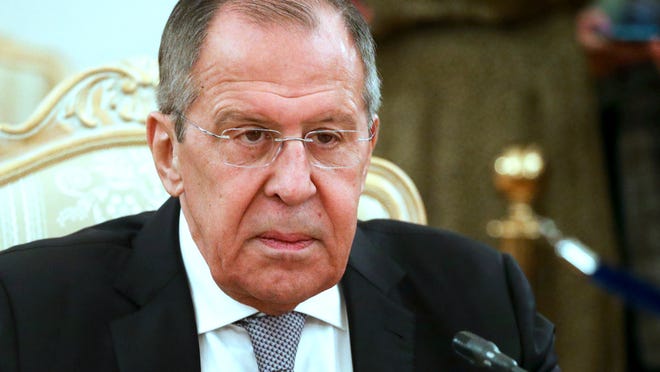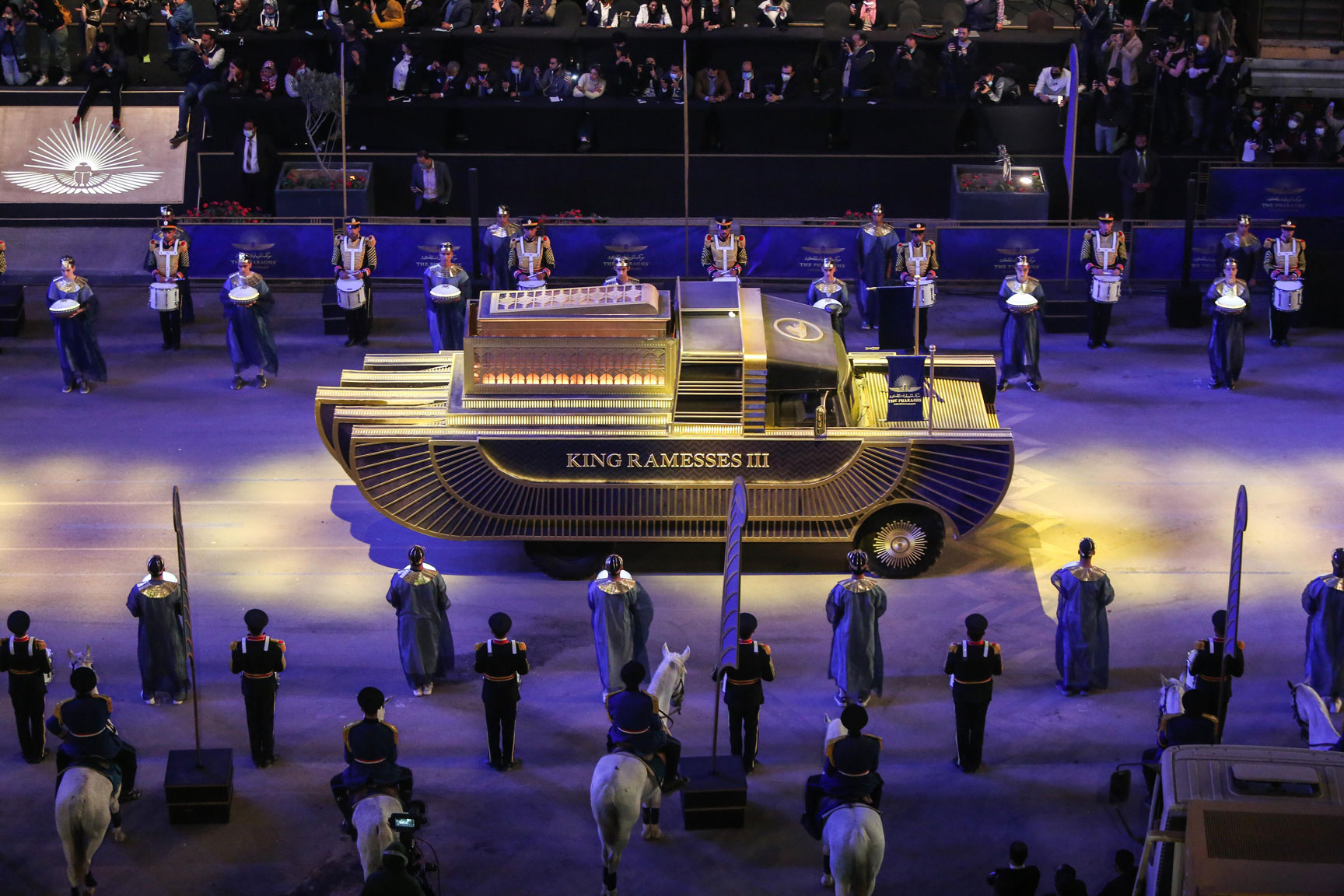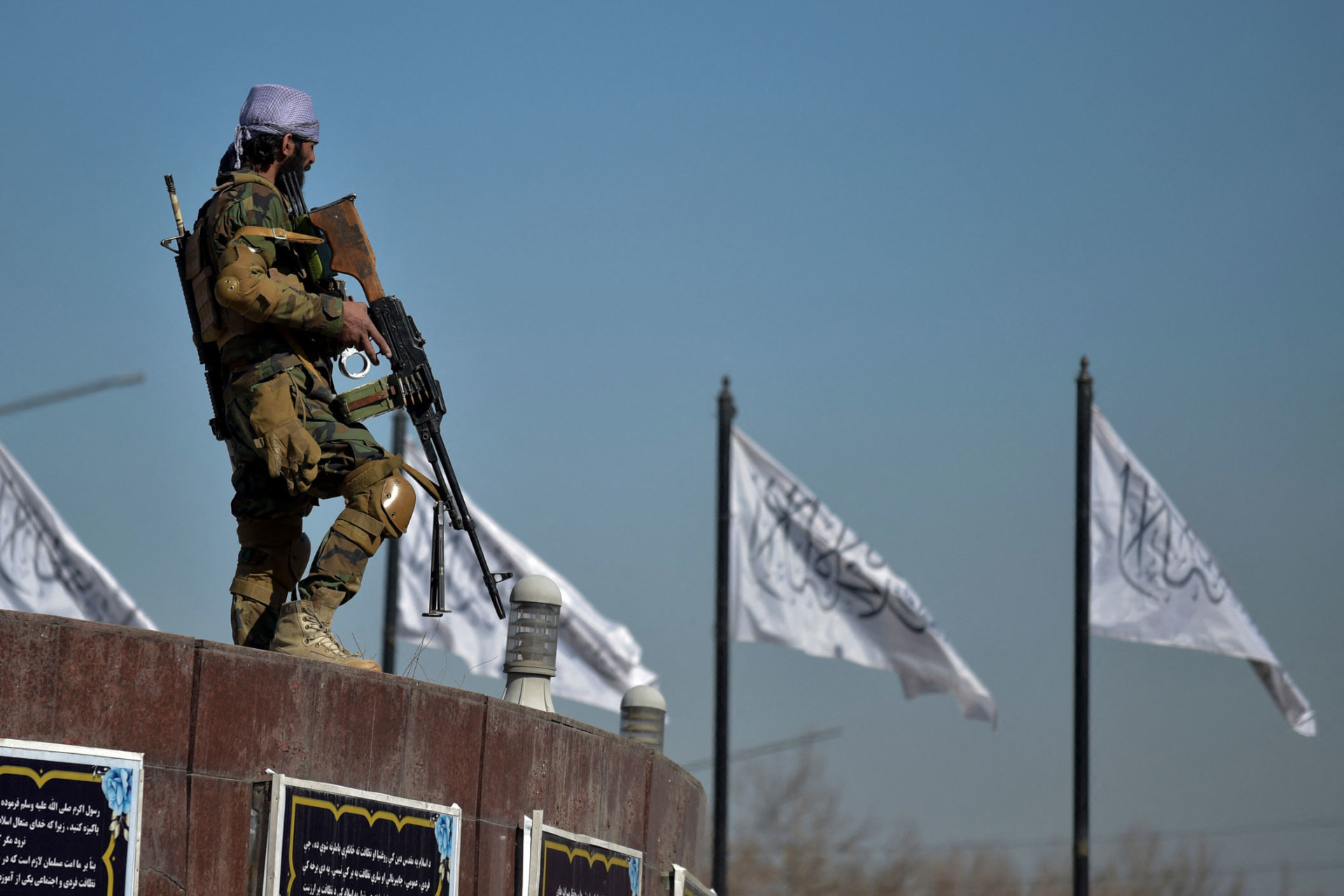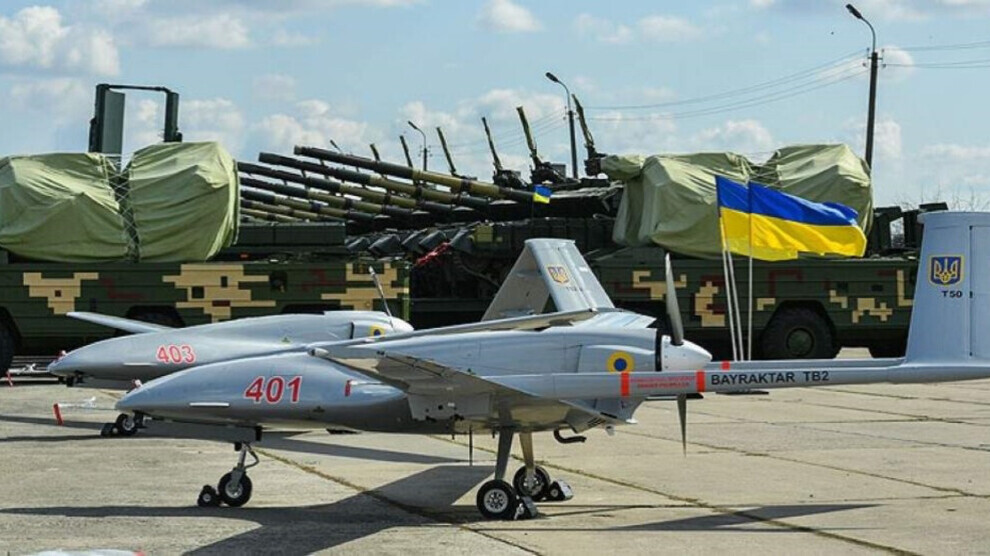Findings from Fox News poll point to deep domestic divisions as well as splits over Biden’s handling of Ukraine crisis
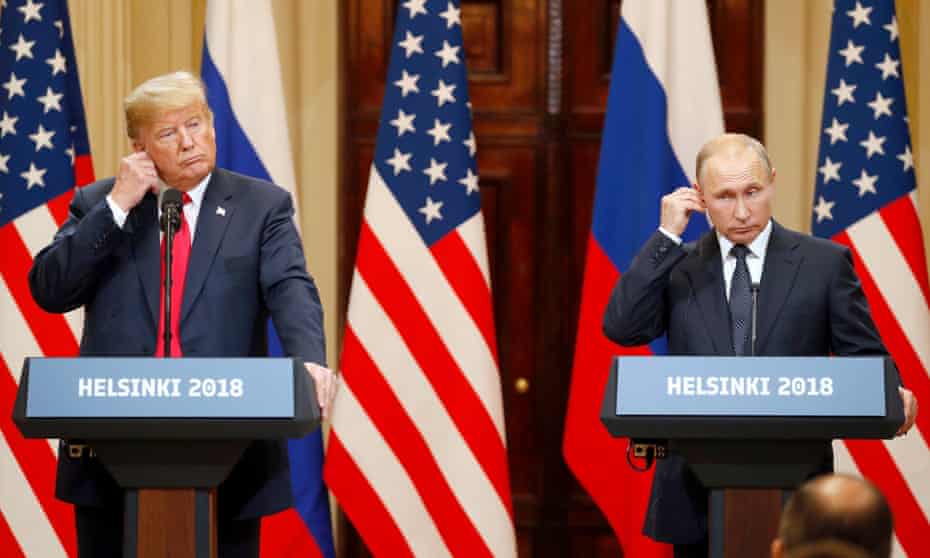
Martin Pengelly in New York
Fri 25 Feb 2022
More Republicans have a negative view of Joe Biden than of Vladimir Putin and more Democrats have a negative view of Donald Trump than of the Russian leader, according to a new poll.
The findings point to deep domestic divisions as well as disagreement over Biden’s handling of the Ukraine crisis.
Fox News released the poll, which it said was carried out before Russia invaded Ukraine.
It said 92% of Republicans had a negative view of Biden while 81% had a negative view of Putin. Among Democrats, 87% had a negative view of Trump and 85% a negative view of Putin.
Biden has condemned the Russian invasion and introduced tough economic sanctions, in concert with other world powers.
Trump has repeatedly praised Putin and criticised Biden, on Thursday adapting a favorite golfing metaphor to claim the Russian leader was playing his counterpart “like a drum”.
Trump’s attacks are in line with those from Republicans in Congress, who claim Biden has been too weak on Russia, both as president and as vice-president under Barack Obama from 2009 to 2017.
In the Fox News poll, 56% said Biden had not been tough enough on Russia, 8% said he had been too tough and 29% said he had been about right.
Among Democrats, 42% of respondents said they wanted Biden to be tougher and 47% said his actions were about right.
Fox News said Biden’s numbers tracked closely to the same question about Trump when he was in power. In July 2018, 53% said Trump was not tough enough, 5% too tough and 35% about right.
That month, Russian election interference in Trump’s favor and his links with Moscow were the subject of an investigation in which the special counsel, Robert Mueller, ultimately said he could not say Trump did not seek to obstruct justice.
Also in July 2018, at a summit in Helsinki, Trump and Putin conducted a meeting behind closed doors and with no close aides. What was discussed is not known.
Trump was impeached in 2020, for attempting to blackmail Ukraine, withholding military aid while requesting dirt on Biden. At trial in the Senate, only one Republican, Mitt Romney, voted to convict.
As the Republican nominee for president in 2012, Romney took a more hawkish position on Russia than Obama.
Amid the Ukraine crisis, Republicans have pointed to Romney’s stance on Russia. They have been less keen to mention his vote to convict Trump over Ukraine.
The Utah senator also voted to convict Trump in his second impeachment trial, for inciting the insurrection at the US Capitol on 6 January 2021.
The Fox News poll returned closely matched favorability ratings for the 45th and 46th presidents, Trump on 45% and Biden 43%.
BY CHLOE FOLMAR - 02/25/22
More than half of Americans view a Russia-Ukraine conflict as a critical threat to U.S. interests, according to a Gallup poll released Friday that was conducted before Russia's invasion of Ukraine.
As tensions with Russia rose during Gallup’s Feb. 1-17 World Affairs poll, 52 percent of Americans surveyed said that the conflict was a critical threat.
That is an 8-point increase from 2015, when 44 percent of U.S. adults said that the conflict when Russia annexed the Crimean Peninsula from Ukraine was a critical threat.
Respondents who identified as Democrats (61 percent) were slightly more likely than Republicans (56 percent) to see the conflict as a critical threat.
However, Republicans (72 percent) are more likely than Democrats (64 percent) to see Russian military efforts as a critical threat more generally. Independents were slightly less likely to view Russia as a threat, at 48 percent.
The poll found the least favorable attitude toward Russia in more than 30 years, as only 15 percent of respondents said they had a positive opinion of Russia while 85 percent viewed the country unfavorably.
The percentage of Americans who viewed Russia unfavorably grew by 8 points since numbers were recorded in 2021.
Before 2014, the majority of Americans viewed Russia favorably. Tensions between Russia and Ukraine and Russian attempts to interfere in U.S. elections have caused that number to drop significantly in past years.

A Ukrainian soldier inspects fragments of a downed aircraft in Kyiv, Ukraine, on Friday.
(Vadim Zamirovsky / Associated Press)
BY DAVID LAUTER
WASHINGTON —
Since the 2016 election and Russian efforts to help Donald Trump‘s presidential campaign against Hillary Clinton, U.S. attitudes toward Moscow have featured a stew of partisan memes, personal grievances and Cold War tropes, all superimposed on top of the inevitable tensions between two big international powers.
As wars have so often done, the Russian invasion of Ukraine — predicted for weeks, but still a shock — has quickly begun to clarify who stands where.
One result has been to highlight how little support Trump’s Russia-friendly attitudes have within his party.
Some Republican elected officials have used the occasion to criticize President Biden, mostly by asserting that he has failed to take a tough enough stance. Very few have echoed the favorable comments about Russian President Vladimir Putin that in recent weeks have come from Trump and Tucker Carlson, the influential Fox News commentator.
That could have big consequences.
In the short term, Biden faces relatively little domestic opposition to ratcheting up economic sanctions against Russia. Hesitancy by European allies will constrain him more than domestic concerns. The one line the public clearly does not want to cross is any use of American troops — White House spokespeople have repeatedly stressed that Biden will not do that.
Longer term: It’s possible, although by no means certain, that widely aired pictures of civilian death and destruction in Ukraine at Putin’s orders will undermine support for Trump and other Putin apologists.
A long decline in U.S. views of Russia
The mainstream of American public opinion has flowed against Russia for most of the past decade.
During the late 1980s and 1990s, after the fall of the Berlin Wall and then the collapse of the Soviet Union, U.S. views of Russia were mostly favorable. Attitudes began to sour in the mid-2000s, then worsened starting in 2013, amid growing tensions between the two countries and the 2014 Russian invasion of Crimea, part of Ukraine.
By the time Trump became president, Americans had an unfavorable view of Russia by about a 3-1 margin, according to the Gallup poll, which has tracked U.S. attitudes toward Russia for years.
That image only worsened during Trump’s years in office, despite the former president’s consistent warmth toward Putin — a friendliness that has generated endless speculation, but no clear explanation ever since his presidential candidacy started.
American views of Russia have only worsened since. As the Ukraine crisis intensified this month, Gallup found that 85% of Americans had an unfavorable view of Russia, with just 15% favorable. American views of Ukraine were favorable by nearly 2-1, the poll found.
In a rare bit of agreement, Republicans and Democrats had equally negative impressions of Russia, although Republicans were slightly less favorable than Democrats in their view of Ukraine, 66% versus 57%.
Dissent from that mainstream, anti-Russian view has come largely from two directions.
On the left, a fairly small, but notable, segment views U.S. involvement overseas as a continuation of past imperialist adventures. As tensions have risen in recent weeks, prominent voices in that group have argued that there’s merit in Putin’s complaints about NATO’s expansion into Eastern Europe in the late 1990s and early 2000s. They also have highlighted the uglier sides of Ukrainian nationalism, which includes militias with clearly anti-Semitic and anti-democratic programs. And they’ve called for Ukraine to agree to abandon its goal of eventually joining NATO, while also urging Russia to show restraint.
As a share of the American electorate, however, the anti-imperialist left is in the single-digit range. Support for Putin has come more from the right, from Trump and some of his allies.
After Putin recognized two portions of Ukraine as independent countries — the final pretext for invasion — Trump repeated his long-standing praise for the Russian leader, recounting to a conservative radio talk show on Tuesday how he had watched Putin’s declaration on television.
“I said, ‘This is genius.’ Putin declares a big portion of the Ukraine — of Ukraine — Putin declares it as independent,” Trump said. “Oh, that’s wonderful. So, Putin is now saying, ‘It’s independent,’ a large section of Ukraine. I said, ‘How smart is that?’ And he’s gonna go in and be a peacekeeper.”
“They’re gonna keep peace all right,” he added. “Here’s a guy who’s very savvy.”
Trump returned to the theme the next day.
“I mean he’s taking over a country for $2 worth of sanctions,” he told an audience of donors and Republican lawmakers at his Mar-a-Lago resort in Florida, according to news reports. “I’d say that’s pretty smart.”
A highly visible coterie of pro-Trump figures have adopted the same position. Trump’s former strategist, Steve Bannon, for example, has hailed Putin as an upholder of traditional values, singling out for praise the Russian leader’s opposition to gay rights. That mirrors a strategy Putin has used of allying himself with conservative nationalists and the Russian Orthodox Church, including the passage of a law in 2013 that the Kremlin has used to shut down LGBTQ organizations and websites and ban services for gay youth.
Outside of Trump, the most high-profile conservative defender of the Russian leader has been Carlson, who, the day before Russia launched its full-scale attack on Ukraine, called that country “a pure client state of the United States State Department.”
Americans have been told “it’s your patriotic duty to hate Vladimir Putin,” Carlson said, and as a result of that hatred, “all of us are about to suffer.”
Despite the large audiences those figures draw, they’ve had limited impact on the views of Republican voters.
A poll in January by YouGov for the Economist magazine found, for example, that only about 1 in 6 Republicans held a favorable impression of Putin; nearly half viewed him very unfavorably. Republicans were only slightly more likely than Democrats to hold a favorable view of the Russian leader.
Similarly, the latest annual survey by the Chicago Council on Global Affairs found that only a tiny share of the public in either party, 2% to 3%, viewed Russia as “an ally — a country that shares or interests and values.” About 1 in 5 Republicans and about 1 in 8 Democrats viewed Russia as “a necessary partner — a country we must strategically cooperate with.”
About two-thirds of Americans in both parties viewed Russia as either “a rival” or “an adversary,” with Republicans about evenly split between the two and Democrats favoring the more adverse description by about 2-1.
Finally, a poll taken Saturday through Wednesday by Echelon Insights, a Republican firm, found that only about 1 in 5 Republican voters thought Biden was being “too aggressive” in his approach to Ukraine. Two-thirds thought he was either being “too cautious” (44%) or “about right” (16%) while the rest were unsure.
The best gauge of public opinion, however, sometimes comes from watching how elected officials behave, and the verdict there was unequivocal.
“Vladimir Putin’s invasion of Ukraine is reckless and evil,” declared House Republican leader Kevin McCarthy (R-Bakersfield), who only rarely shows daylight between his positions and Trump’s.
Senate Republican leader Mitch McConnell of Kentucky urged Biden to “ratchet the sanctions all the way up. Don’t hold anything back.”
McConnell, of course, has tangled with Trump in the past, but he was joined by many others, including Missouri Sen. Josh Hawley, who has diligently positioned himself as a potential heir to the MAGA vote. Hawley declared that “Russia’s brutal assault on Ukraine and invasion of its territory must be met with strong American resolve.”
Through most of Trump’s political career, he paid little price for his dalliance with Putin — most Americans didn’t much care. To some extent, that’s still true — foreign conflicts that don’t involve U.S. troops seldom rank high on voters’ list of worries.
That might begin to change now, suggested Christine Matthews, a Republican pollster and campaign strategist.
Republicans who have followed Trump’s line on Putin may reconsider “when we start to see the casualties coming from Ukraine,” she said. “I don’t know how they could not remember that he’s a really evil guy. I’m hoping this starts to create some distance from those people, or at least they shut up.”
“Tucker Carlson the other day was on [television] saying, ‘What reasons do I have to dislike Putin?’ I think we’re going to see a lot of reasons very quickly that we have not to like Putin.”

Hundreds of people sought shelter in an underground train station in Kharkiv, Ukraine, as the Russian invasion continued Thursday.
(Marcus Yam / Los Angeles Times)
Our colleagues Nabih Bulos and Marcus Yam are on the ground in Ukraine. Here’s what they’ve been seeing.
Other Los Angeles Times staff members in Washington, Los Angeles and elsewhere have been following a host of stories about the growing war.
To single out a few:
Don Lee in Washington and Stephanie Yang in Beijing looked at the difficult choices facing Chinese President Xi Jinping.
Tracy Wilkinson examined the reasons behind Putin’s obsession with Ukraine.
Stokols reported on Biden’s latest round of sanctions.
U.S. diplomats have been in intense talks with counterparts from dozens of countries seeking votes for a tough United Nations resolution condemning Russia’s invasion of Ukraine, but some major countries, such as India, are not yet on board, Wilkinson reported.
Jon Healey, Lee, Suhauna Hussain and Kenan Draughorne examined the potential impact on the economy nationally and in California.
Lorraine Ali reported on Carlson’s efforts to backpedal from his previous statements supporting Putin.
And Kate Linthicum, Henry Chu and David Pierson reported on the international reaction to the invasion — a reminder of the kind of war that many Europeans thought the continent had left behind.

